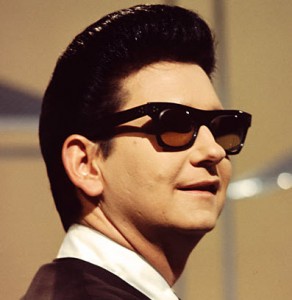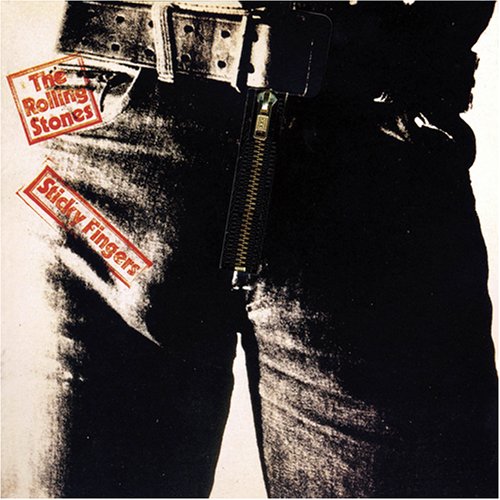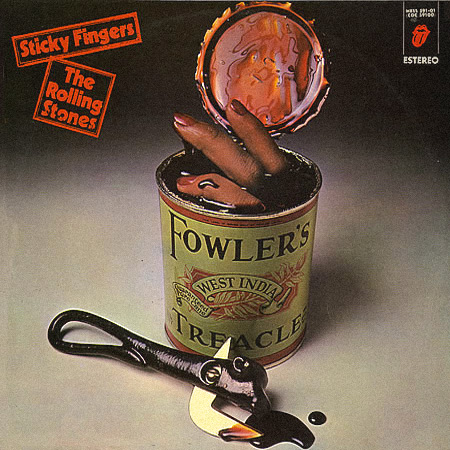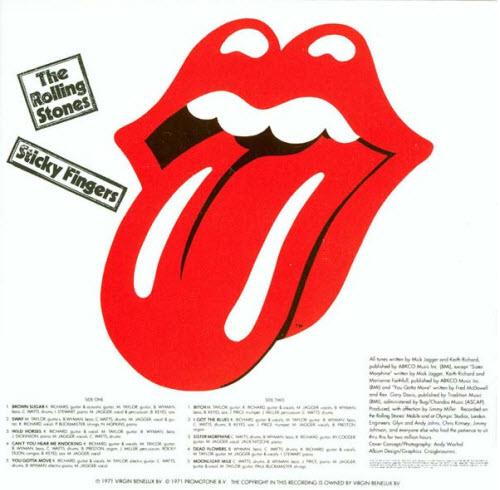Sticky Fingers was never meant to be the title. It’s just what we called it while we were working on it. Usually though, the working titles stick.
~Keith Richards 1971While many hold their next album, Exile On Main St., as their zenith, Sticky Fingers, balancing on the knife edge between the 60s and 70s, remains their most coherent statement.
~Chris Jones (bbc.co.uk)
#1 – Brown Sugar:
Wikipedia:
| Released | 23 April 1971 |
|---|---|
| Recorded | 2–4 December 1969, Muscle Shoals Sound Studio, Sheffield, Alabama; 17 February, March – May, 16 June – 27 July, 17–31 October 1970, and January 1971,Olympic Studios, London, UK; except “Sister Morphine”, begun 22–31 March 1969 |
| Genre | Rock |
| Length | 46:25 |
| Language | English |
| Label | Rolling Stones |
| Producer | Jimmy Miller |
Sticky Fingers is the ninth British and 11th American studio album by English rock band The Rolling Stones, released in April 1971. It is the band’s first album of the 1970s and its first release on the band’s newly formed label, Rolling Stones Records, after having been contracted since 1963 with Decca Records in the UK and London Records in the US. It is also Mick Taylor’s first full-length appearance on a Rolling Stones album, the first Rolling Stones album not to feature any contributions from guitarist and founder Brian Jones and the first one on which Mick Jagger is credited with playing guitar.
The album is often regarded as one of the Stones’ best, containing songs such as the chart-topping “Brown Sugar” and the folk-influenced “Wild Horses”, and achieving triple platinum certification in the US.
#3 – Wild Horses:
During the tour of the States we went to Alabama and played at the Muscle Shoals Studio. That was a fantastic week. We cut some great tracks, which appeared on Sticky Fingers – You Gotta Move, Brown Sugar and Wild Horses – and we did them without Jimmy Miller, which was equally amazing. It worked very well: it’s one of Keith’s things to go in and record while you’re in the middle of a tour and your playing is in good shape. The Muscle Shoals Studio was very special, though – a great studio to work in, a very hip studio, where the drums were on a riser high up in the air, plus you wanted to be there because of all the guys who had worked in the same studio.
~Charlie Watts in 2003
Recording:
Although sessions for Sticky Fingers began in earnest in March 1970, The Rolling Stones had recorded at Muscle Shoals Studios in Alabama in December 1969 and “Sister Morphine”, cut during Let It Bleed’s sessions earlier in March of that year, was held over for this release. Much of the recording for Sticky Fingers was made with The Rolling Stones’ mobile studio unit in Stargroves during the summer and autumn of 1970. Early versions of songs that would appear on Exile on Main St. were also rehearsed during these sessions.
#9 – Dead Flowers:
To my mind the things that Ry (Cooder) plays on have a kind of polish that the Stones generally began to develop around that time. The rough edges came off a bit. Mick Taylor started putting on the polish that became the next period of the Stones out of the raw rock and blues band.
~Jimmy Miller in 1979
In 2003, Sticky Fingers was listed as #63 on Rolling Stone magazine’s 500 Greatest Albums of All Time.
Track Listing:
- “Brown Sugar” 3:48
- “Sway” 3:50
- “Wild Horses” 5:42
- “Can’t You Hear Me Knocking” 7:14
- “You Gotta Move” (Fred McDowell/Gary Davis) 2:32
- “Bitch” 3:38
- “I Got the Blues” 3:54
- “Sister Morphine” (Jagger/Richards/Marianne Faithfull) 5:31
- “Dead Flowers” 4:03
- “Moonlight Mile” 5:56
Personnel:
- The Rolling Stones
- Mick Jagger – lead vocals, acoustic guitar on “Dead Flowers” and “Moonlight Mile”, electric guitar on “Sway”, percussion on “Brown Sugar”
- Keith Richards – electric guitar, six and twelve string acoustic guitar, backing vocals
- Mick Taylor – electric, acoustic and slide guitar (not present during “Sister Morphine” sessions)
- Charlie Watts – drums
- Bill Wyman – bass guitar, electric piano on “You Gotta Move”
- Additional personnel
- Bobby Keys – saxophone
- Jim Price – trumpet, piano on “Moonlight Mile”
- Ian Stewart – piano on “Brown Sugar” and “Dead Flowers”
- Nicky Hopkins – piano on “Sway”, “Can’t You Hear Me Knocking”
- Jim Dickinson – piano on “Wild Horses”
- Jack Nitzsche – piano on “Sister Morphine”
- Ry Cooder – slide guitar on “Sister Morphine”
- Billy Preston – organ on “Can’t You Hear Me Knocking” and “I Got the Blues”
- Jimmy Miller – percussion on “Can’t You Hear Me Knocking”
- Rocky Dijon – congas on “Can’t You Hear Me Knocking”
- Paul Buckmaster – string arrangement on “Sway” and “Moonlight Mile”
- Engineers – Glyn Johns, Andy Johns, Chris Kimsey, Jimmy Johnson
- Cover concept/photography – Andy Warhol
We made (tracks) with just Mick Taylor, which are very good and everyone loves, where Keith wasn’t there for whatever reasons… People don’t know that Keith wasn’t there making it. All the stuff like Moonlight Mile, Sway. These tracks are a bit obscure, but they are liked by people that like the Rolling Stones. It’s me and (Mick Taylor) playing off each other – another feeling completely, because he’s following my vocal lines and then extemporizing on them during the solos.
~Mick Jagger in 1995
Spotify playlist of the day:
Other APR-23:
- Roy Kelton Orbison (April 23, 1936 – December 6, 1988), also known by the nickname The Big O, was an American singer-songwriter, best known for his distinctive, powerful voice, complex compositions, and dark emotional ballads. Orbison grew up in Texas and began singing in a rockabilly/country and western band in high school until he was signed by Sun Records in Memphis. His greatest success came with Monument Records between 1960 and 1964, when 22 of his songs placed on the Billboard Top Forty, including “Only the Lonely”, “Crying”, and “Oh, Pretty Woman”. His career stagnated through the 1970s, but several covers of his songs and the use of “In Dreams” in David Lynch’s Blue Velvet revived his career in the 1980s. In 1988, he joined the supergroup Traveling Wilburys with George Harrison, Bob Dylan, Tom Petty, and Jeff Lynne and also released a new solo album. He died of a heart attack in December that year, at the zenith of his resurgence. His life was marred by tragedy, including the death of his first wife and his two eldest sons in separate accidents.
 –
– - Yankee Hotel Foxtrot is the fourth album by Chicago-based rock band Wilco. The album was completed in 2001, but Reprise Records, a Warner Music Group label, refused to release it. Wilco acquired the rights to the album when they left the label. In September 2001, Wilco streamed the entire album for free on their website. Wilco signed with Nonesuch Records (another Warner label) in November of that year, and the album was officially released on April 23, 2002.
 –
– - Bob Dylan released “Bob Dylan at Budokan” in the US in 1979.
Check out my post –> Bob Dylan at Budokan
– - Ramones is the eponymously titled debut studio album by the American punk rock band the Ramones. It was released on April 23, 1976 through Sire Records. Prior to the band signing to Sire, they were seen by Lisa Robinson, an editor of Hit Parader, during an early 1975 performance. Robinson began popularizing the band by writing about them in the magazines she edited. Robinson contactedDanny Fields and asked him to manage the band, which he agreed to in November 1975. A Marty Thau-produced demo album was recorded at 914 Sound Studios and included “Judy Is a Punk” and “I Wanna Be Your Boyfriend”. Soon after the demos were presented to Sire A&R co-ordinator Craig Leon the band was signed to Sire Records.
-
Released April 23, 1976 Recorded February, 1976 at Plaza Sound,Radio City Music Hall in New York City Genre Punk rock Length 29:04 Label Sire (US & UK), Philips (Europe) Producer Craig Leon
-Egil





Stones went downhill after Mick Taylor left them.
Best period:
Beggars Banquet
Ya-Ya’s
Let It Bleed
Sticky Fingers
Exile
It’s good to see them have Mick Taylor join them on the upcoming tour.
Agree.
That was “the golden period”.
-Egil